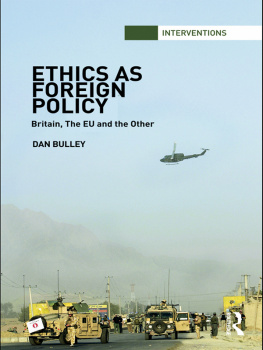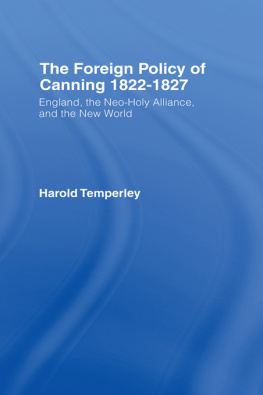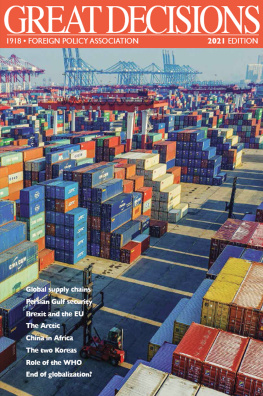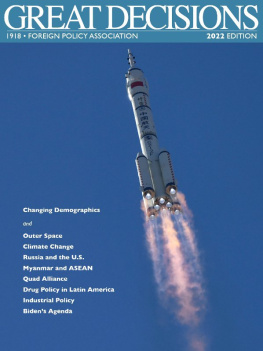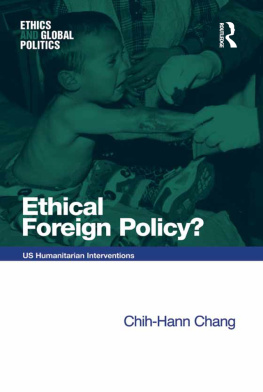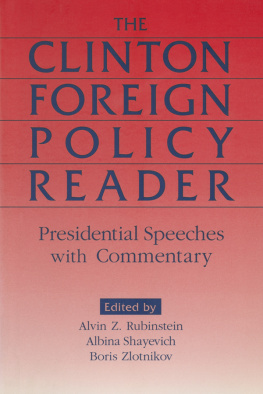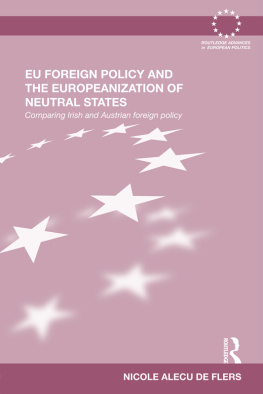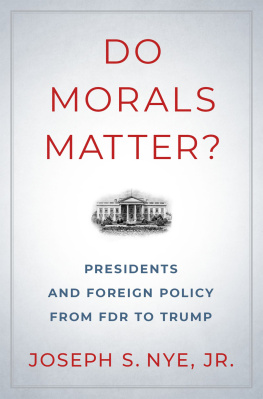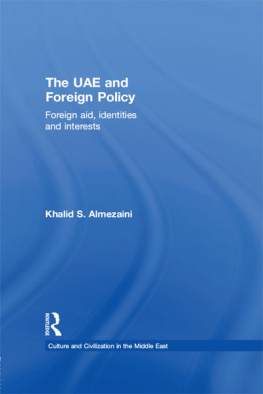Ethics as Foreign Policy
Ethical foreign policy has often been considered utopian, unrealistic and potentially very dangerous. Dan Bulley argues for a reconceptualisation of ethics as foreign policy, as both look to how we can, and ought to, relate to others.
Inspired by the deconstructive thought of Jacques Derrida, Bulley studies the ethical claims of British (19972007) and EU (19992004) foreign policy. These claims are read against themselves to illustrate their deep ambiguity. A textual analysis of speeches, statements and interviews given by foreign policy makers shows that a responsibility to save Africa, to protect Iraqis and to hospitably welcome the Balkans into the EU is also irresponsible, inhospitable and unethical.
The author contends that foreign policies making a claim to morality are ethical and unethical, in their own terms, suggesting that while a truly ethical foreign policy remains ultimately unachievable, it does not justify abandoning a responsible relation to others. Rather, a negotiation of ethics as foreign policy suggests potential individual, context-bound decisions which remain open to contestation and permanent critique. Bulley argues that the goal of ethical foreign policy must be maintained as a productive hope of what is neither completely impossible nor entirely possible.
Dan Bulley is a Lecturer in International Relations in the School of Politics, International Studies and Philosophy at Queens University, Belfast. His research focuses on international political theory and the possibility of international ethics. He has contributed articles to the Review of International Studies and the British Journal of Politics and International Relations.
Interventions
Edited by Jenny Edkins and Nick Vaughan-Williams
University of Aberystwyth and University of Exeter
This series provides a forum for innovative and interdisciplinary work that engages with alternative critical, post-structural, postcolonial, psychoanalytic and cultural approaches to international relations and global politics.
The series aims to advance understanding of the key areas in which scholars working within broad critical post-structural traditions have chosen to make their interventions and to present innovative analyses of important topics. The titles in the series engage with critical thinkers in philosophy, sociology, politics and other disciplines and provide situated historical, empirical and textual studies in international politics.
Critical Theorists and International Relations
Edited by Jenny Edkins and Nick Vaughan-Williams
Ethics as Foreign Policy: Britain, the EU and the Other
Dan Bulley
Ethics as Foreign Policy
Britain, the EU and the Other
Dan Bulley
First published 2009
by Routledge
2 Park Square, Milton Park, Abingdon, Oxon, OX14 4RN
Simultaneously published in the United States and Canada
by Routledge
270 Madison Avenue, New York, NY 10016
Routledge is an imprint of the Taylor & Francis Group, an Informa business
This edition published in the Taylor & Francis e-Library, 2009.
To purchase your own copy of this or any of Taylor & Francis or Routledges collection of thousands of eBooks please go to www.eBookstore.tandf.co.uk.
2009 Dan Bulley
All rights reserved. No part of this book may be reprinted or reproduced or utilised in any form or by any electronic, mechanical or other means, now known or hereafter invented, including photocopying and recording, or in any information storage or retrieval system, without permission in writing from the publishers.
British Library Cataloguing in Publication Data
A catalogue record for this book is available from the British Library
Library of Congress Cataloging in Publication Data
Bulley, Dan.
Ethics as foreign policy : Britain, the EU and the other / Dan Bulley.
p. cm.(Interventions)
Includes bibliographical references.
ISBN 978-0-415-48361-2ISBN 978-0-203-87885-9 1. Great BritainForeign relations1997Moral and ethical aspects. 2. European Union countriesForeign relationsMoral and ethical aspects. I. Title.
JZ1572.B85 2009
172'.4dc22
2008044880
ISBN 0-203-87885-X Master e-book ISBN
ISBN 10: 0-415-48361-1 (hbk)
ISBN 10: 0-203-87885-X (ebk)
ISBN 13: 978-0-415-48361-2 (hbk)
ISBN 13: 978-0-203-87885-9 (ebk)
For Bali
Acknowledgements
Many thanks are due, both to those involved with this book and for those who helped in the way it began life as my PhD thesis. The first must go to my wife, Bal Sokhi-Bulley, who faultlessly proof-read the original work. She also put up with my incessant ranting about many of the issues involved, not least in my sleep. Similarly, to my mother, Carol Shergold, who listened to many crucial monologues on Derrida while walking her dogs, and to my father, Colin Bulley, who challenged my ability to convey ideas with clarity. Fiona Pollard and Cathy Bulley offered great emotional support throughout; Cathy with her own past research experience, Fiona with constant and priceless friendship. I owe Nathan Bulley for having given me the original idea of looking at ethical foreign policy. Charis Joyce was a great encouragement, and Peter Turnill maintained an infectious enthusiasm for my work even when my own lapsed. Thanks to Rani Sokhi for perpetual belief and samosas; Allison and Ian Pollard for providing a refuge. The support of the late Frank and Joyce Shergold made everything achievable.
An enormous debt is owed to Maja Zehfuss and Philippa Sherrington, my tutors from my undergraduate years, who became amazing PhD supervisors and good friends. Majas comments on all my work, as well as continual advice and support, have been of incalculable value. For comments and advice, thanks also to Ben Rosamond, David Campbell and Stuart Elden. Helping me through some tough times at Warwick, a special thanks is due to James Brassett, who provided constant friendly (pub-based) academic criticism and has been a great friend. Also, for friendship, support and comments on papers at Warwick, thanks to Andres Moles, Anil Awesti, Ted Svensson and Owen Parker. This research at Warwick would not have been possible without the 1+3 award from the ESRC.
In terms of turning this work into a book, many thanks to Craig Fowlie, Jenny Edkins and Nick Vaughan-Williams, who showed great confidence in it as the first in this promising and exciting new Routledge Series. Jenny Edkins comments on two drafts were extremely valuable and have made this a much better book. I have greatly benefited from Peter Lawlers interest in the book and comments on sample chapters (especially when a non-security studies based book seemed a forlorn hope). Martin Coward offered timely advice on publication and asked challenging questions of my conference papers which produced this volume.
Finally, writing the last drafts of this book has been achieved in part because of the warm, friendly environment provided by all at the School of Politics, International Studies and Philosophy at Queens University Belfast. In making myself and Bal welcome and familiar with Belfast and its ways have been the symbols of hospitality: Debbie Lisle and Andrew Pepper. Debbie also provided many extremely challenging comments on the original book proposal, all of which have benefited it greatly. Big thanks for their hospitality and comments are also due to Andrew Baker, Mike Bourne, Keith Breen, Susan McManus, John Garry and Tarik Kochi.

